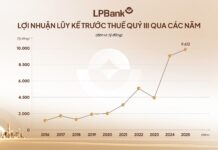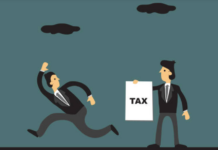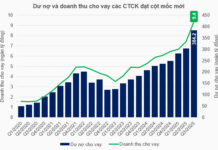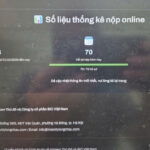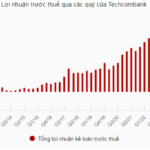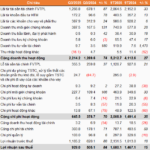From September 1 to November 30, 2025, Hanoi launches a 90-day campaign to cleanse and enrich land data, aiming to enhance transparency and resolve inconsistencies in land records. However, this well-intentioned initiative faces criticism for its outdated and impractical implementation.
Digital Records Exist, Yet Citizens Are Asked to Photocopy ‘Red Books’
Ms. Phương Hiền from Đống Đa district shared that her household received a notice from the local residents’ committee, requiring them to declare their land ownership information and submit it to the committee head. This data would then be compiled and forwarded to the ward office.
According to the notice, those with ‘red books’ (land ownership certificates) must photocopy them, clearly noting their phone number and new address on the copy. Those without a ‘red book’ must register and declare their information to the residents’ committee head. If the ‘red book’ is lost or held by a bank as collateral, citizens must still submit a photocopy or declare the details to the committee head.
“I don’t understand why we need to declare this information when the district already has these records. Why can’t ward officials verify the data in their system instead of burdening citizens with multiple layers of requests? Moreover, requiring photocopies of ‘red books’ is time-consuming and costly,” questioned Ms. Hiền.
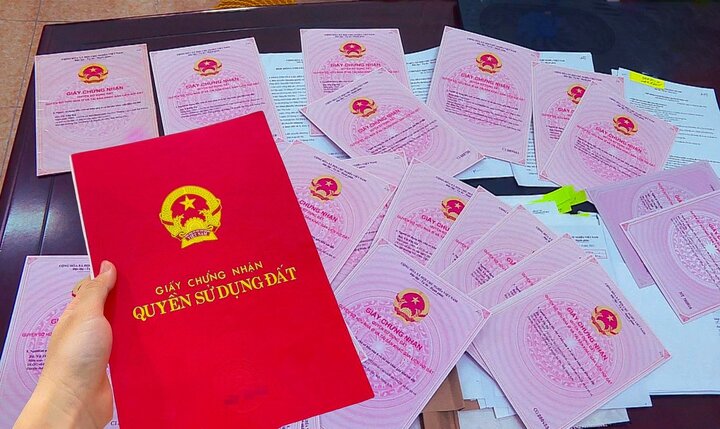
Many wards in Hanoi are requesting citizens to photocopy ‘red books’ as part of the land data cleansing campaign.
Similarly, Ms. Thanh Huyền from Vĩnh Hưng ward mentioned that in mid-September, her ward required households to photocopy their ‘red books’ and the ID cards of all members listed in the document. Her family complied, but since only her mother-in-law’s name was on the ‘red book’, the committee head asked them to photocopy the ID cards of all family members, even those not listed. This led to multiple revisions, and when Ms. Huyền questioned the necessity, she received no satisfactory explanation.
“The committee head simply stated it was a ward requirement. I don’t understand why we must declare and photocopy ‘red books’ and ID cards for the ward. While I support the land data cleansing initiative, this process is unnecessarily cumbersome and risky. Who ensures this sensitive information won’t be compromised as it passes through multiple hands? Can ward officials guarantee no harm will come to citizens due to these requirements?” Ms. Huyền expressed her concerns.
Ms. Huyền also questioned the inefficiency of the process in a technologically advanced era. “When I go to the hospital, I no longer need to carry physical records; results are accessible via my phone. Yet, the ward insists on manual declarations and photocopies of information already submitted. It’s baffling,” she noted.
Avoid Shifting Responsibility onto Citizens
Mr. Lê Hoàng Châu, Chairman of the Ho Chi Minh City Real Estate Association (HoREA), highlighted the irony: The government is the sole authority issuing ‘red books’ and ‘pink books’ to citizens, yet it now asks citizens to redeclare this information.
According to Mr. Châu, the government’s records are the primary and authoritative source, while the ‘red books’ held by citizens are secondary. Therefore, wards and communes should not require citizens to declare or photocopy ‘red books’ but should adopt more flexible methods to avoid inconveniencing the public.
“Citizens cannot create ‘red books’ themselves. Thus, the government must already have this information,” Mr. Châu stated.
Attorney Nguyễn Văn Đỉnh agreed, arguing that requiring manual declarations and photocopies of land certificates is unnecessary, wasting time for both citizens and officials.
Instead, technology should be utilized, allowing citizens to submit digital copies of ‘red books’ and other land documents via apps like VneID or iHanoi. Photocopies hold no legal value; they merely provide clues for officials to search the original database. Digital submissions via apps can achieve the same purpose more efficiently.
“It’s crucial to emphasize that cleansing and standardizing land data is the responsibility of authorized agencies, serving their management needs. Citizens should be seen as partners providing information, not as bearers of this responsibility.
If this principle is clearly established, government agencies can act appropriately, resolving tasks without disrupting citizens’ lives,” Mr. Đỉnh concluded.
Contrary to Administrative Reform and Legal Provisions?
Attorney Diệp Năng Bình bluntly stated that demanding photocopies of ‘red books’ duplicates work already done by authorities, contradicting the spirit of administrative reform.
Current laws clearly mandate that government agencies maintain digital copies of ‘red books’. Article 129.2 of the 2024 Land Law requires digital land records to include copies of land certificates.
Circular 10/2024 from the Ministry of Natural Resources and Environment (now the Ministry of Agriculture and Environment) further emphasizes that the Land Registration Office must scan and store digital copies upon issuance, reissuance, or duplication from the original, before handing the ‘red book’ to citizens (Articles 18, 42).
p>According to Decree 45/2020, government agencies must utilize existing data and cannot require citizens to resubmit information.
Mr. Bình added that this practice also violates legal provisions.
Decree 118/2025 explicitly prohibits officials from requesting “redeclarations or resubmissions of documents already in the system” (Article 17, Clause i.1).
Decree 192/2025 further states that government agencies cannot impose additional document requirements beyond legal provisions (Clause b.1, Article 4).
Thus, if land certificate data exists in the land database, officials must verify it in the system and absolutely cannot request photocopies.
In cases where data is incomplete, agencies must scan the original documents, not demand photocopies. Article 256 of the 2024 Land Law and Circular 10/2024 from the Ministry of Agriculture and Environment (Articles 18, 42) clearly state that for un-digitized records, the Land Registration Office must scan the originals to update the system, without requiring citizens to photocopy documents.
Attorney Lê Văn Thiệp noted that the continued requests for photocopies in some areas may stem from officials being unaware of updated regulations or their desire to maintain physical evidence in files. Digital storage of evidence currently lacks comprehensive data and requires significant server capacity.
Mr. Thiệp suggested that resolving this issue requires robust telecommunications infrastructure, advanced technology, secure storage conditions, and data security measures.
Optimizing Operations: Strategies for Efficient Management of the World’s Second-Largest Waste-to-Energy Plant
The Sóc Sơn Waste-to-Energy Plant in Hanoi has officially commenced operations. Designed to process 5,000 tons of waste daily and generate approximately 90 MW of electricity, this facility is hailed as a technological breakthrough. It serves as a pivotal solution to Hanoi’s waste management challenges while propelling the city closer to its goal of achieving a circular economy.
SGO Group Launches Low-Rise Project in Phúc Thọ, Hanoi, Following T&T and Sunshine Group
On October 18th, SGO Group’s investment ecosystem (comprising Hai Phat Investment & Real Estate Business JSC – Hai Phat Land, SGO Investment & Real Estate Business JSC – SGO Land, and SGO Construction General Contractor JSC – SGO Construction) officially launched the groundbreaking ceremony for the Dong Ca Low-Rise Housing Area project – SGO La Porta Phuc Tho.
Thousands Frustrated as Week-Long Efforts Fail to Submit Social Housing Applications Online
Struggling to secure a NOXH online application for Rice Long Châu, a determined couple took turns requesting leave from work, meticulously planning shifts to ensure one of them could submit their application. Despite their relentless efforts, success remained elusive. The developer’s daily cap of 70 online submissions has left thousands of hopeful applicants in limbo, unable to finalize their registration.








